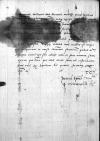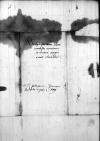Longe abinvicem distamus et ob hoc et nostrae ad vos, et ad nos vestrae litterae cito pervenire non possunt nec solent, quaecumque vero perveniunt, sunt et maiestati regiae et nobis longe gratissimae. Significare enim illis soles multa et scitu digna e[t] iucunda. Quod ut perpetue facias, te hortor et plurimum rogo. Doleo plurimum, quod non mittitur tibi provisio debita, si tamen certo scio, quod ⌊maiestas reginalis⌋ commisit dudum ⌊domino Ludovico⌋, ut te sufficienter pecuniis istic provideret, quo cum honore illius et ⌊maiestatis regiae⌋ stare in ista curia et negotia tibi commissa obire possis, faciamque omnem meam operam, quod tu istic non egeas. Ubi autem defuerint tibi pecuniae et provisiones Neapolitanae tibi non afferrentur, accipias apud ⌊Fucaros⌋ id, quod fuerit tibi necessarium. Scito enim, quod ⌊maiestas regia⌋ omne debitum, quod istic contraxeris, liberaliter exsolvi faciet. Apud nos res omnes, Deo sit gratia, bene se habent. ⌊Gedanenses⌋ tamen et ⌊Elbingenses⌋ Luteranam haeresim sequuntur et ab ea divelli se non permittunt, exspectantes, quid facient alii in ⌊Germania⌋, qui hac labe sunt infecti. Utcumque autem principes ⌊Germaniae⌋ coniventer agere videntur contra hoc tantum et periculosum malum. ⌊Maiestas tamen domini nostri⌋, ut Christianum principem decet, decrevit et armis et omni potentia sua cohibere insolentiam ⌊Gedanensium⌋ et aliorum subditorum suorum de ⌊Prussia⌋, qui contraveniunt institutis universalis ecclesiae, tot saeculis, tot miraculis, tot regum et principum Christianorum auctoritate confirmatis. Citavitque ipsos ⌊Gedanenses⌋ ad hunc conventum maiestas sua nolens eos inauditos condemnare, et ubi non
resipuerint, declarare illos decrevit incidisse poenas legibus nostris et imperialibus contentas, easque exsequi rigidissime curabit. Ad quod omnes regnicolae maiestatem suam co... illi volunt omnibus viribus et facultat[ibus] ... respondemus nuntiis eorundem Gedane... excessus citati sunt huc, ex schedulis praesentibus ... plene cognosces. Niptzitz sodalis tuus missus est nuper in ⌊Ungariam⌋ in causa dominorum ⌊Fucarorum⌋, quibus ⌊maiestas regia⌋ omni ope sua adesse vult et facit omnem suam operam, quo damna, quae illis illata sunt, eis resarciantur. Bene vale.


